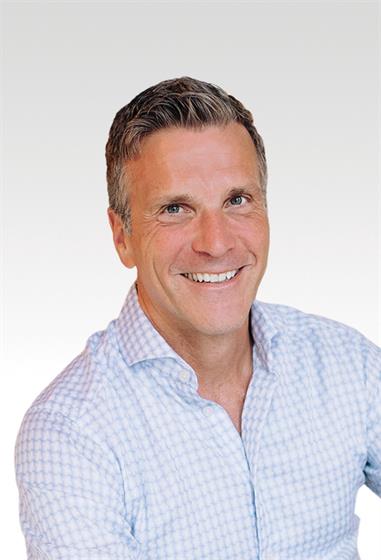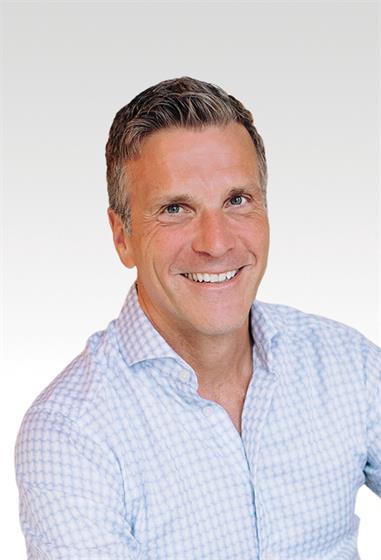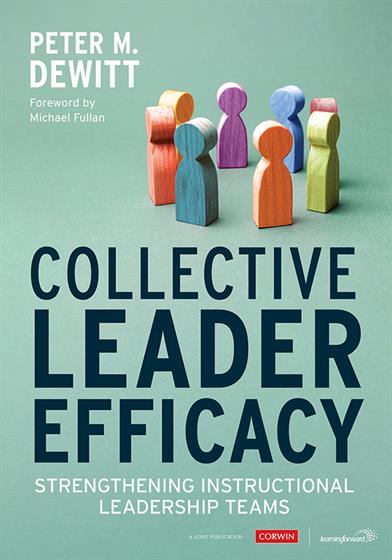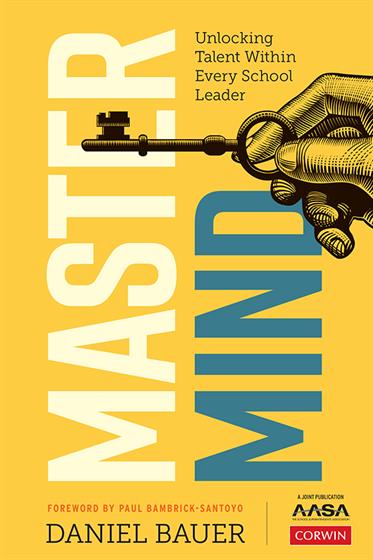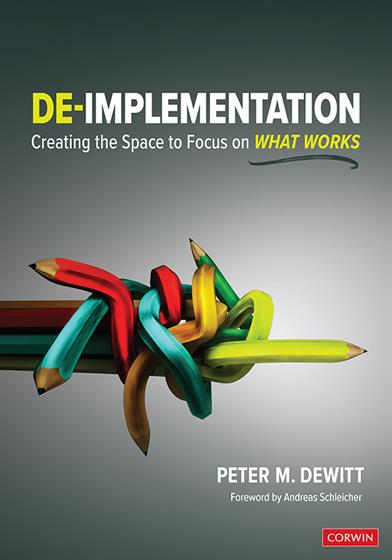Series 3 Leaders Coaching Leaders Podcast
[00:00:00.00] [MUSIC PLAYING]
[00:00:00.82] MODERATOR: Welcome to Corwin's Leaders Coaching Leaders
podcast with host Peter DeWitt. This podcast is from education leaders for
education leaders. Every week, Peter and our guests get together to share
ideas, put research into practice, and ensure every student is learning not by
chance, but by design.
[00:00:19.73] TANYA GHANS: Hi, Peter. This is a special session, but
welcome.
[00:00:24.68] PETER DEWITT: Yeah. Thanks, Tanya. I know, it seems a little
strange, right? It's going to--
[00:00:28.81] TANYA GHANS: Yeah.
[00:00:28.85] PETER DEWITT: --be weird to be on our podcast together, but
now I'm on the receiving end. So--
[00:00:34.55] TANYA GHANS: Yeah.
[00:00:34.97] PETER DEWITT: --don't ask me difficult questions. That's all
I'm going to--
[00:00:37.07] TANYA GHANS: I will do my best, but I won't hold any punches.
Not that this is a punches podcast.
[00:00:42.35] [LAUGHTER]
[00:00:46.13] So yeah. We're doing a little role reversal today, guest and
listeners, and I'm really excited because I think or I deeply feel in my bones
as a as an educator that the topic we're going to discuss on deep
implementation is a critically important one for us to not just discuss for
these times, but in general.
[00:01:07.28] That it really should be vocabulary that is part of everybody,
especially every leaders discourse. And as they think about whatever next steps
they're looking to do, the implementation is a part of it. So before I say any
more because obviously I want the floor for you to be the one to share and tell
us all about this. The implementation is ironically a six syllable word, but
it's about simplifying. [LAUGHS]
[00:01:35.03] PETER DEWITT: I never thought-- wow, that's really good. I
never even thought about--
[00:01:37.61] TANYA GHANS: Yeah. But it's about simplifying. So we always
begin our podcast with really trying to define the terms, and so I want to keep
with that tradition. And so Peter, one, what is the implementation, and why
does it matter and particularly why does it matter now?
[00:01:54.53] PETER DEWITT: Good question. So I never thought about the
syllable piece that was good. So the implementation is the abandonment of low
value practices, that's exactly what the medical research says. I was
introduced to the topic from Aaron Hamilton, who's out of cognition education
New Zealand. He and I were talking about it a long time ago, and I just
couldn't get it out of my head.
[00:02:19.58] It's important because as I was writing a book on collective
leader efficacy and the eight drivers necessary for a school team to come
together, I was reading research from NASSP in the LPI that talked about 42% of
principals wanting to leave their profession. And I started looking in the UK,
and there's a great deal of research about teachers and leaders being burned
out. Australia, same thing. It's a worldwide issue.
[00:02:48.39] And even when I wrote Instructional Leadership a few years
ago, it was about why is instructional leadership so difficult to practice?
It's because our workloads have increased over the past 20 several years since
things like NCLB and increased accountability. There is no better time,
especially after COVID and the mental health and social emotional issues that
we've seen, to be able to at least engage in a conversation about what really
matters for us. What really has an impact and what is just stuff that we're
doing because we've always done it before?
[00:03:26.72] And as you know, because this is the first book in your
editing cycle for Corwin. I wrote a blog about it, and you contacted me and
said, yeah, that. That's what we--
[00:03:40.55] [LAUGHTER]
[00:03:41.45] So it's your fault that I'm writing about this because you're
like, that. That's what I want you to write about. And I was amazed at how
quickly I could. So--
[00:03:50.74] TANYA GHANS: Yeah. I think, if I may say, maybe part of your
quickness is your just to piggyback on what you were saying before about how
urgent this is, is that innovation needs a place to thrive and it needs a place
to come in. I don't think this is about stopping that, and you know I feel you
would agree. But it needs to have the room to be able to do that, and it can't
frankly if the space is just-- it's too cluttered.
[00:04:19.06] PETER DEWITT: Yeah. That's why you and I chose the subtitle,
right?
[00:04:22.90] TANYA GHANS: Yeah.
[00:04:23.56] PETER DEWITT: The space because of the fact that we do need
that space to be innovative. If we're just doing things all the time, then we
don't get the opportunity to really step back and conceptually think about what
is it we should be focusing on? Where should we be spending our time? What's
going to give us the most impact?
[00:04:42.73] And yeah, I would think that one of the miss perceptions of
the implementation is it's about just getting rid of stuff when you and I both
know that it's not. The implementation in what I put together was a partial
reduction or a replacement action. And you can have an informal implementation
or a formal de-implementation.
[00:05:03.22] The informal de-implementation doesn't need a team. It's
something you can do on your own. Formal de-implementation is something where
you need a team. And we explored. You as the editor, me as the writer, we
explored the idea of things like zero tolerance policies and how discriminatory
they can be. And in some cases, how racist they can be.
[00:05:23.59] And we looked at exploring the idea of getting rid of zero
tolerance policies, but replacing them with more culturally responsive
discipline issues like restorative justice or something like that. But it was
also the idea of replacing traditional grading with standards based grading. So
de-implementation is in some cases about a partial reduction, but in other
cases, it's about replacing what we're doing with something that's going to be
much more impactful.
[00:05:54.16] TANYA GHANS: Yeah. And so to continue that just a little bit
because I do think people might hear de-implementation and it's about reducing.
And that while sometimes it is about just stopping something, it is more
nuanced than that. So can you really bring forth-- especially to leaders and
even superintendents who are thinking about this, there is a plan that is
needed behind it at times. It has to be a very thoughtful process. It's not
just you know pulling a switch and saying we're done with that.
[00:06:22.24] PETER DEWITT: Yeah, for sure. Because when I was doing the
research-- and I've done the research for the past year just because I was
planning on adding it to the book on collective leader efficacy, which I did,
so I started really researching it over a year ago. And when I started using
Mentimeter, which is an online engagement tool, in my in person or remote
workshops, I was doing research for that and surveys and everything else.
[00:06:45.64] And so when you're looking at formal de-implementation, it's
really about the idea of the partial reduction or the replacement action.
Replacement action in general is about getting together and starting to look at
this cycle of de-implementation, which is going to be, what are we inquiring
here as far as where we want to spend our time? What's giving us the most
impact?
[00:07:07.93] And the cool thing now is that districts are starting to
engage this work, so I'm starting to get informed by what they're what they're
doing. But it's the idea of, let's look at all of our initiatives and get an
understanding of which ones are actually impactful and why they might not be.
And then inquire-- that's the inquiry part where we develop a theory of action,
if we do this, then this is what's going to happen.
[00:07:30.85] And then you jump into the planning aspect. And in the book, I
have the program logic model, I have a pacing chart, which is something I've
never done before, and you were really great with going through that process
with me, but it was also about I created a implementation checklist that is for
district and building leaders as well as teachers to be able to go through.
[00:07:53.95] And I know that sounds daunting, but it's not. The
implementation checklist is just like most of my work. It's very practical and
something to go through, but it engages us in a conversation we need to have
about is this impactful? Why hasn't it been? What do we need to do?
[00:08:12.25] And then you go into de-implementation process, and that's
where the pacing chart really comes in to start thinking, so if we're going
from traditional grading to standard based grading, here are the things we have
to be able to think about. Here is the pilot group that's going to be starting
this.
[00:08:28.78] And then you go into that whole you know evaluating the impact
of the actions that you're taking. So there is definitely a process, probably
the most comprehensive process than any other book that I've ever written
because I wanted to be thoughtful. Because I heard people say things like. what
if teachers just go in tomorrow morning and start getting rid of stuff?
[00:08:52.78] And I also-- when I was doing the research behind it, I would
do these Mentimeters where I would go through all the research and talk about
partial reduction, replacement action, informal de-implementation, formal
de-implementation. Here's the criteria for de-implementation because that's
even a part of it. Which is, it's not as impactful as it could be. We found
something that's more impactful. In some cases, it causes harm, so we need to
do something different, or it's just not necessary anymore.
[00:09:19.99] And there's that criteria from farmer which comes from the
field of school psychology. And what I found is even after going through all
that, the very first question I would ask in the Mentimeter is, so what would
you de-imlement first? And every time I did this-- and I've done this with 100
and 100 of people by now. Every time, it was always something that people felt
was coming down to them, that was being forced upon them.
[00:09:45.43] TANYA GHANS: OK.
[00:09:45.91] PETER DEWITT: That really caused me-- because I always look
for common themes, that gave me the understanding that I needed to be much more
intentional.
[00:09:53.19] TANYA GHANS: Yeah.
[00:09:53.50] PETER DEWITT: [INAUDIBLE] through and created that process and
all that stuff because we wanted to-- what I wanted people to get to understand
is yes, we do need to do something about that stuff that might be forced upon
us, absolutely. And that's going to take us all to be a part of it. But what
about the things you're doing that might not be impactful that you really do
have control over? And that's a part of it as well.
[00:10:15.94] TANYA GHANS: Yeah. I mean, the intentionality of this is such
a-- is a big part. And I want to talk about this two sides of the same coin
with implementation and de-implementation, which really comes up in your book
as well. But as you were speaking, I thought about where this research came
from the medical field. And why they understand it's so important is because
you know what's-- there's a lot riding on the medical field not being very
clear about what's working and not working. And I think in the medical field,
it shows up in your face very quickly or it can.
[00:10:49.36] PETER DEWITT: Yeah.
[00:10:49.60] TANYA GHANS: And so there is a very strong need to make sure
you're not doing harm or even wasting because there's only-- the same 24 hours
is what everybody is competing with or the 8 hours that you have while you're
at school.
[00:11:00.61] PETER DEWITT: Yeah.
[00:11:01.54] TANYA GHANS: It's just as urgent in schools. It may not show
up in your face as quickly. That's understandable. I think maybe that's one of
the reasons it can-- it's so easy to add on, but the impact can be just as
devastating for children and students and families if we're not sure that we're
focusing on the stuff that really, really works in giving it time to thrive.
[00:11:23.14] So going back to this de-implementation and implementation, in
the book, you really talk about both of these. Can you talk about why that
implementation part is such a big part of de-implementation?
[00:11:37.00] PETER DEWITT: Yeah. And it's because when I was looking at the
medical research, I found an implementation model called prism. And what I
thought was really interesting about it is that on one side, it talked about
the characteristics or the perspective of the doctor, the nurse, the medical
professional. And on the other side, was the patients, the perspective of the
patients. And then you had the characteristics of the doctors, the nurses, and
the other medical professionals and then the patient's characteristics.
[00:12:12.61] So what I did was I adapted that to schools and put in a
school leader and teacher. And then obviously instead of patients, it's the
students. But going through, when you look at the perspectives and
characteristics of all of those-- let's call them stakeholders in a school,
then you go into the whole idea of the implementation part. But one of the
words that came out in that prison was maintenance.
[00:12:40.42] And they even had-- like on each side, there was outside
influences. So people can look at that as their school board or their school
community or situations that happened. But that maintenance piece came up. And
I remember the first time I talked about it, it was with a large group of
directors of teaching learning from across the state of Washington where I'm a
lead advisor.
[00:12:59.92] And they overwhelmingly said yeah, the hard part of
implementation is the maintenance part. And I remember just doing a lot of
thinking about that because when we implement, it's interesting as a writer and
maybe as the researcher side and just somebody who reflects way too much. Is
that when you start to think about the maintenance and the implementation, it
makes me start thinking about, so where does this come from?
[00:13:26.62] And asking questions about, so when you-- you know I run
workshops. I give keynotes. And people have really-- I had a conversation with
the superintendent a few weeks ago because I had said, we have to be careful
when we go to conferences and workshops that we're not going to get the new
shiny toy because we know there isn't one. And we've been saying that for
years.
[00:13:48.82] And a person came up to me after the conference, and he said,
I just want to tell you though, I feel a lot of pressure to bring back
something new because my school board paid for me to be here for three days. And
I was like, wow. I work with a lot of directors across the country and around
the world who have talked about the idea that they go to conferences and
workshops to find something new, and it's caused me to really think about, do
you go to a conference and workshop to get a new strategy or do you go to a
conference and a workshop to inform the practice of what you're doing already?
[00:14:20.98] Those are the conversations that we need to be able to have.
So this is--
[00:14:24.16] TANYA GHANS: Yeah.
[00:14:24.93] PETER DEWITT: --a holistic issue that we have to confront. And
it means that when we're thinking about implementation, how are we asking those
questions already about, how does this look in our school district or our
school already? Because I can guarantee you that there are teachers within the
school or school district that are doing the work already. They just don't call
it the research-ey term. [INAUDIBLE] You should talk to them if you ever go and
make it seem like you're bringing back a brand new idea. So there's even that
part of it that I think we have to be able to address and understand, do we
really need to do all the things that we're doing?
[00:15:02.50] TANYA GHANS: That's important honest conversations that you
need to have in your building. You made me think about incentives and how you
have to think about how you're incentivizing things. Because you may think
it's-- again, maybe it's for innovation and to improve, but if what it actually
feels like is I must do something rather than the goal is making sure we're
every day giving the best we can to our students and families, those are those
are two different things.
[00:15:29.26] And I just want to say, what's also true about the maintenance
piece that you brought up-- in my research on schools, especially high
performing schools-- high achievement, high well-being, schools that are doing
really well, there isn't a lot of change. They figure out what works, however
their methods are, they get that clear, and then they keep at it, keep at it,
keep at it, they really refine it.
[00:15:52.36] And only until that stuff is really at mastery for many people
in the building do they start to bring on new things. They really do treat
their front doors is like, they're the gatekeepers. Only the best can come in.
So I just I just wanted to say that about the maintenance piece. It's really
true. So--
[00:16:12.93] PETER DEWITT: I remember John Hattie and Aaron Hamilton have a
book that just came out. And we--
[00:16:20.23] TANYA GHANS: Impact.
[00:16:21.31] PETER DEWITT: Yeah, Impact with Doug Reeves and Janet Clinton.
And when I was reading the review copy before it was published, they talked
about in there the fact that there's a discrepancy between what the research
says about a strategy and how it's practiced in the classroom. And some of that
is because if I'm a teacher and I've been doing some method or reciprocal
teaching for a really long time, I can convince myself that I'm doing it the
exact way it's supposed to, but that's not always what the research says.
[00:16:50.59] And also, sometimes what's hard about the research is that the
researcher might not have a lot of experience within a classroom. I was a first
grade teacher for seven out of 11 years, and you have 31st graders in a high
poverty city school. Your day to day operations can be just very different. So
it's even understanding those nuances are really important, and that's what I
try to explore within the book. It's not just about what the research says and
the and how we as teachers and leaders implement, it's about that space in
between where we have to be really clear and there needs to be a great deal of
clarity where that's concerned too.
[00:17:31.21] TANYA GHANS: Yeah. And having a conversation like this is the
important first step. [LAUGHS] OK. So school leaders, in particular, I'm
thinking about superintendents or just district leaders or central office
leaders or even principals. I think you alluded to earlier that they can be a
little fearful of this term and what it could mean let loose in their buildings
or in their districts.
[00:17:53.20] PETER DEWITT: Mass dumping out everywhere.
[00:17:55.72] TANYA GHANS: How do you begin to assuage their fears? How can
you help them understand-- it's all of what you've shared already to some
degree, but for that, no, we don't have time to have more teachers and schools
saying, no, we don't want to do something. We feel like we're already pushing
back against-- we don't want to do this. Why do they have to pay attention to
this?
[00:18:18.46] PETER DEWITT: So I think there are a few reasons why. Number
one, the research around mental health and social emotional learning is telling
us we have to pay attention to this because people are burned out. People are
leaving the profession. There is just a high level of burnout because people
are doing so much. And I can't imagine that all of it is worth doing.
[00:18:41.41] Part of what we have to be able to do is create a climate and
a culture within our school where there's a safe space that we can-- we always
talk in group work about psychological safety. This is why I started to talk
about the implementation and the collective leader efficacy book because it's
how a team comes together to engage in this kind of conversation is really
important. We have to do that prep work, and then we can we can create that
safe space where we can be open and honest.
[00:19:09.67] I know of a district that I'm working with that is actually
looking at-- they put all their initiatives up on the up on the wall, and
they're starting to go through and process which ones are going to be the most
impactful or why haven't some of them been impactful? And having that kind of
conversation. And it does take time. This is not a one conversation.
[00:19:32.50] For me, I'm a big fan of reflecting, which means that if I'm
going to be at a meeting where this conversation is going to come up, I need to
know the basics about it. I need to know the formal versus informal. The
partial reduction, the replacement action, all of that kind of stuff. And then
I need to be able to walk away and think seriously about where would I start
when it comes to the implementation?
[00:19:55.21] And engaging in those conversations is really important. I
think that if I was a school leader during this time, I would probably be one
of the first school leaders ever to walk into a school and look at teachers and
say, I really want to have our committee-- our instructional leadership team,
look at taking stuff off of our plate. I really would love to be that person
having that conversation because I can guarantee you, that doesn't happen very
often.
[00:20:25.66] TANYA GHANS: No, it doesn't. And I can I can hear the exhale
in the room.
[00:20:29.89] PETER DEWITT: Yeah.
[00:20:30.34] TANYA GHANS: Right? And so what your book does though is give
people a frame and a shape and a process. Again, the free for all-- I don't
want to-- maybe you start there, you get it all out, but there has to be an
intentional process for really thinking about this, particularly if it's at the
school level.
[00:20:49.85] All right. So we're coming to our closing. And there's been so
much good information here, but I guess I want to end with, there's a spectrum
of the implementation that you've mentioned-- partial replacement, maybe you
are just taking some things away. There's a variety of ways to go about it.
This is important at the classroom level all the way up to the district level.
[00:21:09.77] So maybe even thinking about any teachers or, again,
principals who are listening, what are some things that they could start to
de-implement on their own or really think about or get started with next week
in their schools or maybe this summer as they're thinking about the following
year?
[00:21:27.08] And I think we mentioned some of the larger ones that they
could-- maybe a quick reiterating that a bit-- again, about what are the big
things you can think about? But there are some things that you could get
started doing that's happening in your school right now that could begin to
turn down just the level of pressure that educators feel.
[00:21:45.83] PETER DEWITT: Yeah. One of the places that I would start is
informal de-implementation where we don't need a team because that's probably
going to be the grassroots effort, the ground up kind of thing. If you go in
and say to people, this is what informal is. You don't need a team, and you can
either-- you can do a partial reduction of how often you check email.
[00:22:07.73] And I'm a little shocked at how much email has actually come
up over and over and over again over the past more than a year now. We are so
tied to email. We are so afraid to not be instantaneous in how we answer email.
And so a partial reduction would be, you know what? I'm going to set boundaries
around email. I'm going to have an automated response for my email that says, I
check email at 7:30 noon and 5 o'clock in the afternoon.
[00:22:40.14] And after that, I go home to be with my family. And set a
boundary like that. If those times don't work for you, figure out sometimes
they do. But I'll answer you in the next 24 hours or so. Something like that.
So you have the ability to breathe. And as a leader, if you do that, you can
get up and get into more classrooms and that kind of stuff I think is really
important.
[00:23:01.85] Meetings. Do you really need to have the number of meetings
that you have? That's not a-- that's not something that's a formal
de-implementation. That's an informal de-implementation. Do we really have to
meet as much as we do? Or if we are going to meet. Let's make it worthwhile
where we have a focus on learning.
[00:23:22.79] One of the replacement actions that I offer is the fact that I
put in success criteria. Every time I'm going to run a workshop, give a
keynote, or have a coaching session, I start off with success criteria to say,
how are we going to know at the end of this meeting we're successful? And I
actually ask the audience, even in keynotes, I've asked the audience, give me
your success criteria so I can tie it in to making sure that everybody finds
this time to be very valuable.
[00:23:46.61] Those are really easy things that they can do right away.
Teachers can actually look at the number of assessments. And this did not come
from me even though I wrote it in the book, I had teachers who actually said, I
don't have to give the number of assessments that I'm giving because I don't
check them.
[00:24:05.70] So why did you do it? So even looking and saying, I can reduce
the number of assessments that I'm giving to my students because I'm not
keeping up with them anyway. If I give fewer, I'm actually going to be able to
do something productive with them. So those are some really great places that
people can start.
[00:24:23.61] TANYA GHANS: Yeah.
[00:24:23.81] PETER DEWITT: [INAUDIBLE]
[00:24:24.65] TANYA GHANS: I would absolutely agree that everyone can likely
find one meeting that they can get rid of. Do a survey, get some sense of where
your people stand, but something will show up on that survey about a meeting
that people don't need. I put my money on it. Peter, talking to you about this
again reminds me of how excited I got about it when I first saw you write about
this in Ed Week.
[00:24:45.83] It's the same feeling months later about this on some level
seems so obvious, but yet not. It is so needed yet no one talks about it. There
is no formal language to speak about it to give it the earnest seriousness it
deserves. It's not a flippant thing. But if we don't inject this kind of
thinking into the conversation, I'm always thinking about the children on the
ground. That third grader only gets that year to get what he or she needs.
[00:25:15.35] And so we have got to be doing everything we can to make sure
that every all of that time is used as efficiently and as effectively as possible.
So I take all the credit or the all the whatever you want to give for putting
this book out into the world.
[00:25:33.17] PETER DEWITT: Well, thank you, because I do. I remember that
email with a link to the blog and you said, this.
[00:25:38.81] TANYA GHANS: Yeah.
[00:25:39.17] PETER DEWITT: This should be your next book. And I'm thinking,
oh, I just finished collectively [INAUDIBLE] came out a month ago. There's no
way I can write a book. And then I think it was like three days later, I
contacted you said, OK.
[00:25:50.11] TANYA GHANS: Here it is. And the world needs it. So in all
kinds of spaces-- but we're talking about education, so Peter, what a joy.
Pleasure thinking about this with you again today and just learning about it
again, and I really hope our listeners get a lot out of this and feel empowered
to go back to their spaces and say, OK, let's just wait a moment and see. And
that that's OK to say too.
[00:26:14.74] PETER DEWITT: Well, I'll tell you, thank you. Thank you for
your partnership on it because it was the first time we got to work together.
And that to me was just an amazing experience, and people will know when they
open up the cover that it was during a very difficult time in my life. So you
were just amazing during the whole entire piece. But I will now love to turn
the hot seat over to another guest so I don't have to sit-in it. But thank you.
[00:26:39.97] TANYA GHANS: All right. You can get out of the light now,
[LAUGHS] go cool off. Peter, enjoy the rest of your day until we learn again
together soon.
[00:26:48.22] [MUSIC PLAYING]

